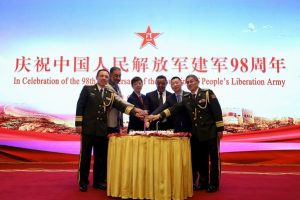A few days ago the Ethiopian prime minister appeared in the House of Peoples Representatives and answered questions presented by the MPs on current affairs in the country. These sessions of parliament update citizens and other interested parties on what exactly is going on in the country and what policies are in the pipeline besides outlining which ones did not bear the expected fruits. It is a sort of updating the House as well as the public at large on government operations. Of course the prime minister has established a certain tradition of communicating to the public through his social media outlets conveying important messages on certain occasions. Festivities and important events such as the launch of the Green Legacy Year are among those.
People have the opportunity to hear the measures taken by government on any number of national and regional issues that affect their lives. In this regard one can note that the premier still has a sizeable proportion of citizens who are ready to give him the benefit of doubt on what his government has been doing, even outside his constituency. But approval rates may not be those we saw two years ago when there was extraordinary enthusiasm around him. In politics two years are enormous!
The country has been undergoing lots of things in very recent weeks. The outbreak of COVID 19 is one. The economy in dire straits is another knocking on the doors of the majority struggling to make ends meet. In pandemic it is like insult added to injury. At the same time, there are the ‘political foes’ of the government who seem not to refrain from trying to fish in troubled waters.
The issue of the GERD, Ethiopia’s flagship project on the Nile, is at a critical point as the country braces to begin filling the dam. Egypt and company are stepping up their unfounded counter propaganda that Ethiopia is threatening their existence. The premier has made it clear that Ethiopia has no intention of harming any of its neighbours except exerting relentless efforts to lift millions out of stark poverty! The reality is that Egypt does not seem to settle with the idea of sharing the waters of the Nile with any one including its legal and natural owner: Ethiopia! This is just absurd! May be too many years of undisturbed use of the water has induced Egypt to feel that the water has become its exclusive property! However, the sooner they adapt to the new reality, the better for all parties.
Egyptians cannot bury their head in the sand and expect that Ethiopians (and the other riparian countries) will always submit to the rhetoric and narratives of Egyptian politicians which always make the Nile an issue of their national sovereignty. Why are Ethiopia and others not allowed to make the same argument over their resources? Who is the supernatural force that attributes the exclusive use of a transboundary river to one nation?
Undoubtedly, negotiations are the only civilized manner of resolving this controversy without escalating emotions and controversies. It is too stupid to believe that one can settle things with the use of force in today’s complex and interdependent world!
After all, it has been ascertained that the GERD is an asset for the entire subregion and ‘a win-win solution’ for all! The prime minister took his time to explain all the nuts and bolts of his policies. One of the more interesting questions was the one that referred to the government as ‘looking weak and refraining from asserting its rights against those who openly disregard its policies and laws.
The answer the premier gave appeared to be a demonstration of strength and confidence and not one which feels threatened to lose its authority every time someone in opposition expresses dissent or tries to project the impression that they do not recognize the government. Questioning the nature of the question, the premier pointed out that if it was the usage of force, the strength of the Ethiopian military, that would leave no doubts on its might.
Given that Ethiopia is a work in progress towards democracy, the premier said there was no issue of stifling voices that may be in opposition with government. But he advised that it was up to the parliament to control certain media whose only purpose for their existence appeared to be to attack the premier and the establishment as a whole. Being targeted by insults did not and would not stop his government from completing the GERD and proceed with other efforts geared towards battling poverty.
The premier said the alleged weakness of a government is not gauged by the excessive usage of force at any circumstance. The government watches carefully what is going on but does not need to intervene panicking. He warned that patience should not be confused with weakness.
The premier said it is a confident government based on solid support and does not panic for any quantity of minor alarms. If indeed the situation warranted special attention, there should be no doubts that it would act consequently. He stressed that beyond taking care of an internal security issue, the government can even spare its resources to other countries. The AU and the UN are witnesses. Hence, he went on, whatever effort is exerted to discredit our force will not surprise us because we know that there are several forces both here as well as abroad whose only job is to try and create or promote disruption twenty four hours a day so that we may take off our eyes from our development efforts. But I must disappoint them because we will never take off our eyes from the basic projects of our country aimed at pulling our people out of stark poverty. We want to close the chapters of shame from our history he underlined with vehemence!
He said Ethiopians were fed up of asking for charity to fulfill their basic needs. They need clean potable water, they need electric power. These are basic necessities any government worthy of its name must commit to fulfill. The premier lashed out ‘there was no worse humiliation than having to live in such stark poverty!
The premier showed all of his resolve and frustration against all those who try to hijack Ethiopia’s reformative trajectory with intestinal bickering over ethnicity and the like. He said it was time to give a definitive halt to such useless arguments! Asked by a TPLF MP on the alleged isolation of the Tigray Regional State from the development projects of the federal government Abiy explained at length his position on how he could have no motive to do that. He outlined all the efforts the federal government exerted to bring substantial change in Tigray more than ever before and that any issues the local government may raise was done to project the wrong impression because some leaders of TPLF are engaged in useless rhetoric hiding the truth from the people whom he said was confident that sooner or later will come to the fore.
The premier also explained at length the rumors that the government had forced the National Electoral Board to follow the schedule it wanted rather than leave it independently to decide. He said his party had insisted in carrying out the elections in any case but it was the Board which objected given that under the circumstances it was impossible to carry out credible elections. He mentioned the chairperson’s threat of submitting her resignation if anything was imposed on her by the government and that he said showed the institutional neutrality of her agency and appreciated her resolve.
Moreover, the premier also outlined all the measures taken to cope with the pandemic underling the wonderful job carried out by the health institutions and by all those who gave a hand to help in the various initiatives aimed at coping with the fall outs of the pandemic.
However, the most impressive part of his accounts was for many how he portrayed the developments in the economy not brushing it with doomsday scenario. Rather he talked about ‘opportunities amid crisis moments’ and preparations for post COVID scenarios. This was perhaps something that many did not expect.
Regarding some aspects of the economic performance the premier tried to pick positive points such as the performance of the national air carrier, the horticulture industry and the export of certain goods exploiting even unexpected opportunities from the pandemic. He insisted that the economy would continue to grow albeit at lower rates despite the pandemic and talked about better days and preparations to improve our performance for the post-pandemic situation. The growth he prospected is above three per cent going as high as 9%. He vowed that all projects would continue despite the pandemic albeit with less intensity. He specifically appreciated the greening and beautifying of the capital city as something that will have wonderful result in view of the anticipated post Covid boom in tourism. The premier took more than three hours answering to all the questions and shed some light on important policy issues of his government at times misconstrued by many.
The Ethiopian herald June 14,2020
BY FITSUM GETACHEW





